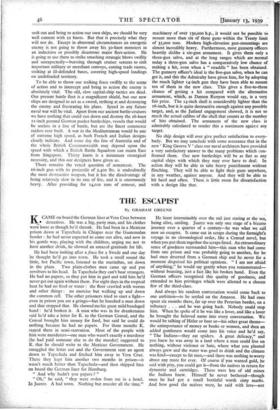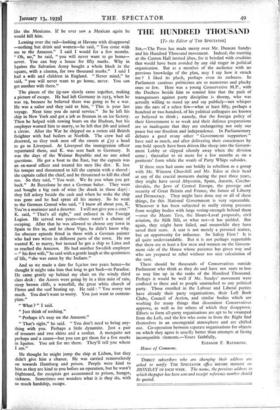THE ESCAPIST
By GRAHAM GREENE Ir CAME on board the German liner at Vera Cruz between 110 detectives. He was a big, pasty man, and his clothes were loose as though he'd shrunk. He had been in a Mexican prison down at Tapechula in Chiapas near the Guatemalan border : he had never expected to come out alive, and now in his gentle way, playing with the children, urging me not to have another drink, he showed an amazed gratitude for life.
He had been looking after a finca for a Swede and one day he thought he'd go into town. He took a stroll round the little, hot Pacific town, listened to the marimbas, sat down in the plaza. Two plain-clothes men came up and put revolvers to his head. In Tapechula they can't bear strangers. He had no papers, so they put him in gaol and told him he'd never get out again without them. For eight days in the tropical heat he had no food or water : the floor crawled with worms and other things : no exercise but walking up and down the common cell. The other prisoners tried to start a fight— even in prison you are a gringo—but he knocked a man down and that stopped that. He showed me his great mild bandaged hand : he'd broken it. A man who was in for drunkenness said he'd take a letter for K. to the German Consul, and the Consul brought him money for food, but said he could do nothing because he had no papers. For three months K. stayed there in semi-starvation. Most of the people with him were murderers—one man who wasn't exactly a murderer (he had paid someone else to do the murder) suggested to K. that he should write to the Mexican Government. He smuggled the letter out and the Government sent an agent down to Tapechula and fetched him away to Vera Cruz. There they kept him another two months in prison—it wasn't much better than Tapechula—and then shipped him on board the German liner for Hamburg.
" And why hadn't you papers ? "
" Oh," he said, " they were stolen from me in a hotel. In Juarez. A bad town. Nothing but murder all the time." He leant interminably over the rail just staring at the sea, being alive, smiling. Juarez was only one stage of a bizarre journey over a quarter of a century—he was what we call now an escapist. It came out in scraps during the fortnight's voyage in no chronological order, like a Conrad novel, but when you put them together the scraps fitted. An extraordinary sense of goodness surrounded him—this man who had .come from one prison and was probably going to another, for he had once deserted from a German ship and he never for a moment disguised his political opinions. " I am not afraid of anything," he would say gently when you remonstrated— without boasting, just a fact like his broken hand. Even the German officers recognised this quality of goodness, and extended to him privileges which were allotted to a chosen few of the third-class.
And always his random conversation would come back to one ambition—to be settled on the Amazon. . He had once spent six months there, far up over the Peruvian border, on a tributary . . . and he was going back. Nobody could stop him. When he spoke of it he was like a lover, and like a lover . he brought the beloved name into every conversation. We would be talking of Hitler or beer or—his other great theme— the unimportance of money or books or women, and then an added gentleness would come into his voice and he'd say, " The Indians—they eat spiders. A great delicacy," and you knew he was away in a land where a man could live on nothing, without violence or hate, where what you planted always grew and the water was good to drink and the climate was kind—except to fat men,—and there was nothing to worry about any more for ever. Of course if you wanted gold, he said with pity, you could get it—from the natives in return for dynamite and cartridges. There were lots of old mines the Indians knevi. Himself he never bothered—though once he had got a small bottleful worth sixty marks. And how good the natives were, he said with love—not like the Mexicans. If he ever saw a Mexican again he would kill him.
Leaning over the rail—looking at Havana with disapproval —nothing but drink and women—he said, "you come with me to the Amazon." I said I would for a few months. " Oh, no," he said, " you will never want to go home— never. You can buy a house .for fifty marks. Why in Iquitos the Salvation Army bought a whole block in the square, with a cinema, for two thousand marks." I said I had a wife and children in England. " Never mind," he said, " you will never want to go home, never. You can get another wife there."
The pieces of the jig-saw slowly came together, making a picture of escape. He had left Germany in 1913, when he was Isi, because he believed there was going to be a war. He was a sailor and they said to him, " This is your last voyage. Next time you do naval service." So he left his ship in New York and got a job as fireman in an ice factory. Then he helped with rowing boats on the Hudson, but his employer wanted him to marry, so he left that jbb and joined a circus. After the War he shipped on a rotten old British freighter with bad boilers at Norfolk. The crew had all deserted, so they took men off the streets at £25 a head to go to Liverpool. At Liverpool the immigration officer repatriated them, and K. was sent back to Germany. It was the days of the Weimar Republic and no one asked questions. He got a boat to the East, but the captain was an ex-naval officer and treated his men like dirt. K. lost his temper and threatened to kill the captain with a shovel : the captain called the chief, and he threatened to kill the chief too. So they said, " You wait. We fix you when you get back." At Barcelona he met a German baker. They went and bought a big cask of wine (he drank in those days) : they fell asleep beside the cask and when he woke the ship was gone and he had spent all his money. So he went to the German Consul who said, " I know all about you, K. You're a mutineer and a deserter. I will not give you a cent." K. said, " That's all right," and enlisted in the Foreign Legion. He served two years—there wasn't a chance of escaping. After that he was allowed to choose any town in Spain to live in, and he chose Vigo, he didn't know why. An obscure episode fitted in there with a German painter who had two wives in different parts of the town. He too wanted K. to marry, but instead he got a ship to Lima and so reached the Amazon. He had another Swedish employer —" his first wife," he said with a gentle laugh at the quaintness of life, "she was eaten by the Inclinns " And so we made a date for Iquitos two years hence—he thought if might take him that long to get back—to Paradise. He came gently up behind my chair on the windy third class deck : the Azores were going by in a thin- mist of rain, steep brown cliffs, a waterfall, the great white church of Flores and the surf beating up. He said : " You worry too much. You don't want to worry. You just want to contem- plate."
" What ? " I said.
" Just think of nothing."
" Perhaps it's easy on the Amazon."
" That's right," he said. " You don't need to bring any- thing with you. Perhaps a little dynamite. Just a pair of trousers and two shirts and a sunhat. A mosquito net perhaps and a canoe—but you can get them for a few marks in Iquitos. You ask for me there. They'll tell you where I am."
He thought he might jump the ship at Lisbon, but they didn't give him a chance. He was carried remorselessly on towards Hamburg and prison. People were kind to him as they are kind to you before an operation, but he wasn't frightened, for escapists get accustomed to prison, hunger, sickness. Sometimes one wonders what it is they do, with so much hardship, escape.







































 Previous page
Previous page